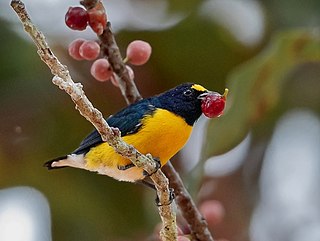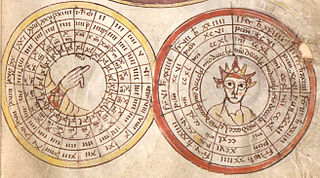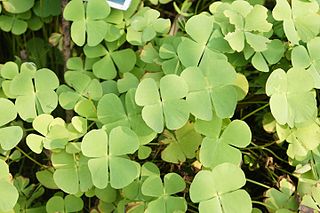Related Research Articles
The minute is a unit of time usually equal to 1/60 of an hour, or 60 seconds. In the UTC time standard, a minute on rare occasions has 61 seconds, a consequence of leap seconds. Although not an SI unit, the minute is accepted for use with SI units. The SI symbol for minute or minutes is min. The prime symbol is also sometimes used informally to denote minutes of time.

The little stint, is a very small wader. It breeds in arctic Europe and Asia, and is a long-distance migrant, wintering south to Africa and south Asia. It occasionally is a vagrant to North America and to Australia. The genus name is from Ancient Greek kalidris or skalidris, a term used by Aristotle for some grey-coloured waterside birds. The specific minuta is Latin for "small.

Tagetes is a genus of annual or perennial, mostly herbaceous plants in the sunflower family Asteraceae. They are among several groups of plants known in English as marigolds. The genus Tagetes was described by Carl Linnaeus in 1753.
Gobipteryx is a genus of prehistoric bird from the Campanian Age of the Late Cretaceous Period. It is not known to have any direct descendants. Like the rest of the enantiornithes clade, Gobipteryx is thought to have gone extinct near the end of the Cretaceous.

Marchena is a genus of jumping spiders only found in the United States. Its only described species, M. minuta, dwells on the barks of conifers along the west coast, especially California, Washington and Nevada.

The white-bellied big-eared bat is a bat species from South and Central America, as well as Trinidad and Tobago in the Caribbean.

The white-vented euphonia is a species of bird in the family Fringillidae.

The marsh tchagra or blackcap bush-shrike is a species of passerine bird placed in the monotypic genus Bocagia in the family Malaconotidae. It is native to marshes in the tropics and subtropics of Africa. It is sometimes placed in the genus Tchagra.

A moment (momentum) was a medieval unit of time. The movement of a shadow on a sundial covered 40 moments in a solar hour, a twelfth of the period between sunrise and sunset. The length of a solar hour depended on the length of the day, which, in turn, varied with the season. Although the length of a moment in modern seconds was therefore not fixed, on average, a moment corresponded to 90 seconds. A solar day can be divided into 24 hours of either equal or unequal lengths, the former being called natural or equinoctial, and the latter artificial. The hour was divided into four puncta (quarter-hours), ten minuta, or 40 momenta.

Tagetes minuta is a tall upright marigold plant from the genus Tagetes, with small flowers, native to the southern half of South America. Since Spanish colonization, it has been introduced around the world, and has become naturalized in Europe, Asia, Australasia, North America, and Africa. Tagetes minuta has numerous local names that vary by region. In the Andes it is known as Huacatay or Wacatay, and in other regions it is common as chinchilla, chiquilla, chilca, zuico, suico, or anisillo. Other names include muster John Henry, southern marigold, khakibos, stinking roger, wild marigold, and black mint.
Hemiconcavodonta is an extinct genus of bivalve in the extinct family Praenuculidae. The genus is one of three genera in the subfamily Concavodontinae. Hemiconcavodonta is known solely from late Ordovician, Caradoc epoch, fossils found in South America. The genus currently contains a single accepted species, Hemiconcavodonta minuta.

Zephyranthes minuta is a plant species very often referred to as Zephyranthes grandiflora, including in Flora of North America. The latter is, however, an illegitimate name because the original author in coining the name Zephyranthes grandiflora listed the older name Amaryllis minuta as a synonym. This makes "minuta" the acceptable epithet under the ICN. In the UK it is a recipient of the Royal Horticultural Society's Award of Garden Merit.

Pterolophia is a genus of longhorn beetles of the subfamily Lamiinae, containing the following species:
Gerd Haxhiu is an Albanian football coach who has managed Apolonia Fier, Bylis Ballsh, Skënderbeu Korçë, Besa Kavajë.

Pterolophia melanura is a species of beetle in the family Cerambycidae. It was described by Francis Polkinghorne Pascoe in 1857. It has a wide distribution in Asia.
Pterolophia gibbosipennis is a species of beetle in the family Cerambycidae. It was described by Maurice Pic in 1926.
Pterolophia instabilis is a species of beetle in the family Cerambycidae. It was described by Per Olof Christopher Aurivillius in 1922. It is known from Seychelles.
Pterolophia guineensis is a species of beetle in the family Cerambycidae. It was described by James Thomson in 1864, originally under the genus Alyattes.

Marsilea minuta, or dwarf waterclover is a species of aquatic fern in the family Marsileaceae. It is not to be confused with Marsilea minutaE.Fourn. 1880, which is a synonym for Marsilea vestita. Other common names include gelid waterklawer, small water clover, airy pepperwort, and pepperwort, though the lattermost also applies to plants in the genus Lepidium. In French it is called marsilea à quatre feuilles and petite marsilée, the latter appearing to be a calque with the Latin botanical name. In Chinese it is 南国田字草, literally "southern field word grass," referencing the similarity of the leaflet shape to the Chinese character for "field." The Koch Rajbongshi people and Garo people call it shusni shak. It is called 'শুশনি শাক' in Bengali. In parts of India it can be called sunisanakka In Indonesian it is semanggi, but this name also applies to Marsilea crenata. In Japanese it is nangokudenjiso and in Thai it is phakwaen. In Malaysian it is tapak itek. In the Philippines it is kaya-kayapuan.
References
- ↑ BioLib.cz - Pterolophia minuta. Retrieved on 8 September 2014.